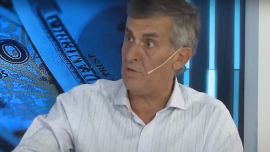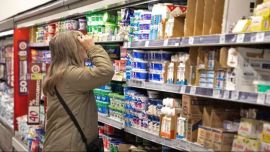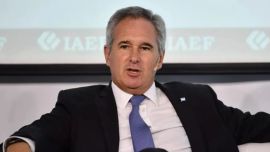For weeks the national conversation in times of sickness here has been dominated by calls, mainly by lobbies, to ease the coronavirus lockdown first announced on March 20. Argentina's politicos were caught in a tough place because no loosening of the restrictions would inevitably have lead to part of the cash-strapped population simply finding ways to skirt the restrictions to make a living.
Now reality is hitting home. A total of 344 daily coronavirus cases were reported on Wednesday and 23 deaths were also confirmed in 24 hours. For the first time more than 300 cases were reported in a day. Alberto Fernández, the centre-left Peronist president, late last week was fuming over what he described as irresponsible calls to return to business as usual (or nearly).
Yet, at the same time, the president had to strike a balance. Effectively, more businesses have been allowed to open. Fernández was flanked by Buenos Aires City Mayor Horacio Rodríguez Larreta, a prominent leader of the centre-right opposition coalition, and Buenos Aires Governor Axel Kicillof, a progressive Kirchnerite at his press conference extending the lockdown. What stuck the mind of many was the president's comparison with Sweden’s laxer approach.
The virus does not strike you down according to your political hue. What the crisis has brought is an unprecedented burying of the hatchet after almost 20 years of political rifts since the rise of Kirchnerismo in 2003 (and beyond). Public opinion has welcomed the sight of leaders who belong to warring parties rolling up their sleeves together to fight the coronavirus as best they can. It’s not good for the agitators on any side.
Most of Argentina has now moved into Phase 4 of the lockdown easing. But the metropolitan area (Buenos Aires City and Greater Buenos Aires) is being hit the hardest with most cases being reported here. Still there have been subtle differences. The centre-right mayor of the capital has now allowed children to go out for one-hour walks at the weekends with their parents (according to the DNI national identity card number of the adults). The provincial governor, who rules over the sprawling working-class urban belt that surrounds the capital, has only allowed children to go out with their parents on errands.
The pressure is now on the mayor and the governor alike, because slums and care homes are being hit hard by this virus. The increase in cases has prompted speculation that the mayor will have to backpedal on the easing, which has allowed most shops to open (excluding shoe and clothes shops) and for people to go out to do shopping limited to their neighbourhoods. Both Rodríguez Larreta and Kicillof could face a political nightmare if their health systems collapse due to the rise in cases (something that’s not happening right now).
The president gets on well with the opposition mayor, but he rifled criticism at the centre-right administration that preceded him during his presser. For example, Fernández accused former centre-right Buenos Aires Province governor Maria Eugenia Vidal of refusing during her 2015-2019 mandate to equip and open hospitals in Greater Buenos Aires that were already built. Vidal, who was defeated by Kicillof in last year's election, had argued that the hospitals were too expensive to run. The president's jab enraged the parliamentary wing of the Juntos por el Cambio coalition, who accused him of picking a malicious argument in times of a health crisis.
The lobbying was still noisy this week and it came with a looming economic debacle. The Fernández administration is trying to restructure nearly US$70 billion in debt. The deadline for the bondholders to accept the offer, tabled by Economy Minister Martín Guzmán, came and went on May 8 (the Friday on which the president held his lockdown press conference). But it is now clear that Fernández, despite the hardball approach being played by his US-trained economy minister, wants to avoid a default. Technically there is now a new deadline set for May 22 and the government is trying to coax the reluctant bondholders into making a counter-offer that can lead to a successful negotiation.
The president has implied that the investment funds owed billions by the republic are fuelling the lobbying. A dollar was worth 137 pesos in the black market on Thursday. Argentina has strict currency exchange controls (desperately introduced by the then-outgoing centre-right administration in 2019) that allows citizens to purchase only US$200 a month. A dollar was worth nearly 70 pesos in the banks (plus a 30 percent tax for the average saver). Fernández has argued that the black market is tiny and that the 137-70 difference in value is a ploy by speculators to give his government a hard time while it tries to clinch a deal with the hawkish bondholders.
If the funds are playing the instability game to trigger a political crisis, it’s not happening right here and now. Most of the centre-right opposition leaders holding office have had no choice but to close ranks behind Fernández, who is extremely popular according to polls. Those opposition leaders will only begin to turn on the head of state if and when his popularity drops (unlikely to happen ahead of next year's midterms).
The nation's political wheels are starting to turn. Congress has finally opened using screens to hold virtual sessions. The government has tried to manage the economic side of the crisis by offering soft loans, paying salaries in the private sector, and granting an emergency family income of 10,000 pesos to at least eight million people. Will it be enough?
Argentina is perpetually hooked on manic political arguing. But the jump in the number of coronavirus cases this week has been sobering.
























Comments